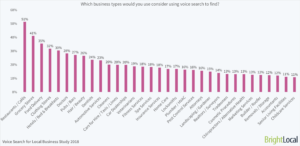Is your online business prepared for the voice search era? Yes, yes, people are increasingly searching the Internet using their voice-activated personal assistants and voice search features in their mobile devices. In fact, you may be a part of the revolution, too, if you’ve been conversing with your Siri/Amazon Echo/Cortana recently.
Here’s the thing about voice search: it’s poised to bring a lot of changes for online businesses, so an appropriate preparation is critical. In fact, it’s already brought a lot of changes that you may have heard about.
For example, Google has introduced the so-called Mobile-First update earlier this year that prioritizes mobile-friendly devices. Since a lot of voice search requests are made on mobile devices (in 2016, the share was 20 percent, but it’s much higher now), Google strives to make their browsing experience as comfortable as possible.
Obviously, these changes impact your online business, so let’s talk about this in more detail and how can you prepare for the rise of voice search.

The Need for Voice Search Optimisation
With voice searches on the rise, many digital marketing researchers completed a number of studies to help businesses prepare. For example, if you want to know whether your customers are using voice search to find your business online, you can refer to this eMarketer study that found that the heaviest users of voice-activated personal assistants are people between the ages of 25 and 34.
Here’s the complete data.
As you can see, the number of Baby boomers, Gen Xers, and Millennials using voice-activated digital assistant users in the U.S. is steadily increasing, with the latter generation experiencing the fastest growth in users.
What this means for your online business is that a lot of your target audience members are voice search users. For example, if you’re targeting Millennials, voice search optimization is a must because more than 39 percent of them are known to use it.
The next research paper that supports the importance of optimizing for voice search comes from BrightLocal. It’s called Voice Search for Local Business Study 2018 and it provides a lot of interesting findings for both online and brick and mortar businesses, including:
- 58 percent of customers have used voice search to locate information about local businesses in the last 12 months
- 27 percent of customers visit a local business’s website after performing a voice search
- 46 percent of voice search users look for local businesses daily.
But what kind of local businesses are these voice search users look for?
Here’s the complete data.

As you can see from the image above, the top industries for voice searches are restaurants/cafes, grocery stores, food delivery services, clothing stores, and hotels/bed & breakfast. However, it’s reasonable to claim that businesses in all industries will benefit from voice search optimization (just look at how many business types are people looking for).
So, if your business has the potential for local voice searches, optimization for them is important because otherwise, you’ll be losing your customers to other local businesses. And this clearly applies to brick and mortar locations as well because if you fail to provide your business’s information to services like Google Maps, you’ll lose a lot of people using “near me” searches to find a local business.
And the number of people using “near me” searches has been increasing in recent years, according to data from Google.

Growth in “near me now” searches, source: Think with Google
Clearly, adopting the technology as soon as possible increases your chance of being more competitive, so don’t wait until it’s too late.
What Does Voice Search Optimisation Involve?
There are a number of critical ways to optimize your SEO for voice search, including:
- Adapt your content by writing in a natural, conversational style because people use it to converse with their devices
- Claim and complete your free Google Business Listing to ensure that your business is displayed in local search results (e.g. result for “near me” searches)
- Be mobile-friendly and use a responsive design for your website (Mobile first update, remember?)
- Improve the speed of your website because (a slow speed is one of the sure-fire signs you need to update your site!) Google prioritizes fast-loading websites that allow it to generate quick results, so it offers PageSpeed Insights for free speed testing.
- Include more long-tail keywords in your content. These are longer than head keywords and include more details related to location, price, user, and characteristics of a product or service.
Get Ready For Voice Search
Voice search has already brought some significant changes to the world of online business, so don’t wait until your competitors become early adopters and optimize. It’s clear that voice search will get even more popular in the next years as more and more people use personal assistants on their devices.
So, start getting ready today and commit to completing all optimization requirements described above, and you’ll make the voice of your business heard in the noisy online market.
Tom Jager is professional blogger. He works at A-writer. He has degree in Law and English literature. Tom has written numerous articles/online journals. You can reach him at G+ or Facebook.
